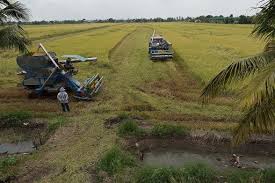Two years after losing its place as the world’s biggest rice exporter, Thailand is eyeing a return to the top spot as the impact of a bungled subsidy scheme eases and it sells cheaper grain to a grateful global market.
The subsidy, which offered farmers up to 50 percent above market rates for their rice, helped former premier Yingluck Shinawatra win the rural votes she needed to take office in 2011.
But it also sent tremors through the world market before spectacularly unravelling, leaving Thailand with around 18 million tonnes of over-priced rice and Yingluck skewered by a corruption charge.
Thailand was pushed off the top spot by India in 2012, as buyers hit back at the kingdom’s attempt to fund the costly subsidy by driving up global prices through grain hoarding.
India and Vietnam moved swiftly to gobble up Thailand’s crumbling market share, with the Indian government rapidly releasing more of their own rice for export.
Thailand’s junta, which seized power in May, ended the rice scheme soon after the coup and is flogging stockpiles to soften the price of Thai rice to around $450 a tonne — comparable to India and Vietnam.
Many now predict the kingdom’s industry is again set to surge.
“I’m sure we can get back our world title this year,” said Chookiat Ophaswongse, honorary president of the Thai Rice Exporters Association.
– Getting back to the top –
From January until September 2, the kingdom sold seven million tonnes of the grain — already more than for the whole of 2013 — according to Chookiat.
It should sell 10 million tonnes by the end of the year, as experts call for farmers to focus on producing higher quality — and higher value — strains of rice.
Darren Cooper, senior economist at the London-based International Grains Council, said it is “quite possible (Thailand) could edge out India in 2014″, explaining the kingdom has already begun to reclaim portions of the key African market it lost — such as Nigeria, Ivory Coast and Ghana.
“The real story will be next year when I think Thailand will be easily the world biggest exporter,” he said.
Much also depends on India, Cooper added, after New Delhi flooded lower premium rice to the export market to off-set the retreat of the Thai grain and avert a feared global food crisis.














